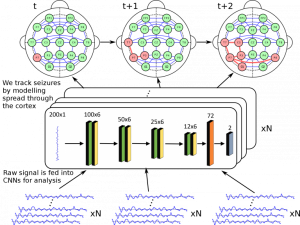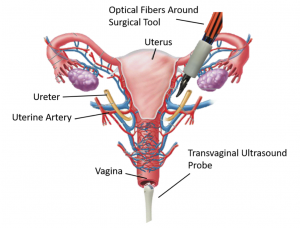Backed by NIH funding, Muyinatu “Bisi” Bell’s innovative work is enhancing diagnostic accuracy, improving surgical precision, and ensuring equitable health... Read More
Researchers
Todd McNutt
Jeffrey H. Siewerdsen
Related Projects
Noninvasive Localization of Epileptic Seizures
 Epilepsy affects nearly 3.5 million people in the United States and is linked to a five-fold increase in mortality. While epilepsy is often controlled with medication, 20-40% of patients are medically refractory and continue to experience seizures in spite of drug therapies. The alternative for...
Epilepsy affects nearly 3.5 million people in the United States and is linked to a five-fold increase in mortality. While epilepsy is often controlled with medication, 20-40% of patients are medically refractory and continue to experience seizures in spite of drug therapies. The alternative for...
Photoacoustic-Guided Hysterectomy Performed with a da Vinci Surgical Robot
 Approximately 600,000 hysterectomies are performed each year in the US to remove the uterus. This surgery requires cauterization and clipping of the uterine arteries, located close to and overlapping the ureter, which can cause accidental injury to the ureter. We are developing...
Approximately 600,000 hysterectomies are performed each year in the US to remove the uterus. This surgery requires cauterization and clipping of the uterine arteries, located close to and overlapping the ureter, which can cause accidental injury to the ureter. We are developing...
SpineCloud
The overall goal of the SpineCloud project is to gain understanding and predictive power of the factors underlying spine surgery outcomes – particularly the unacceptably broad variability associated with spinal fusion. Such capability will yield evidence-based insight and decision support to improve patient selection, enable more optimal surgical planning, identify...
Related News
The $13 million award from the Advanced Research Projects Agency for Health will go toward developing a transformative diagnostic tool... Read More
Malone researchers are part of two of the four boundary-pushing proposals funded in this year’s cycle of the SURPASS initiative.... Read More
Johns Hopkins researchers partnered with a local imaging device company to develop an efficient, real-time lumbar puncture guidance system.... Read More




